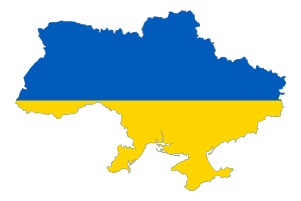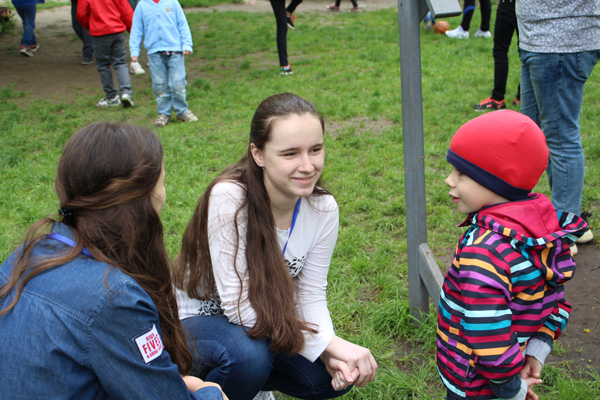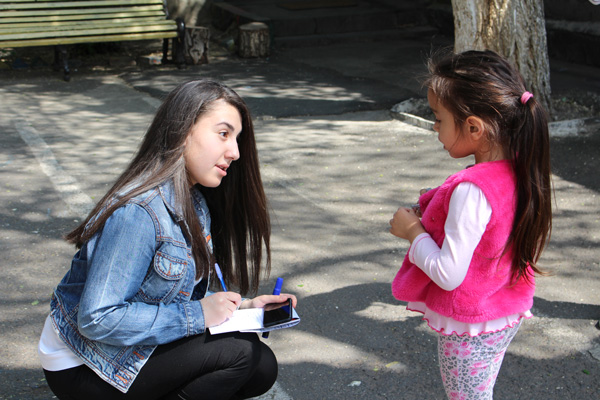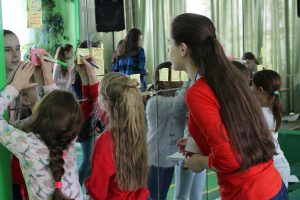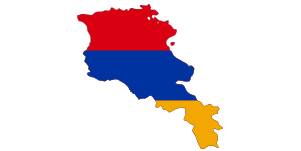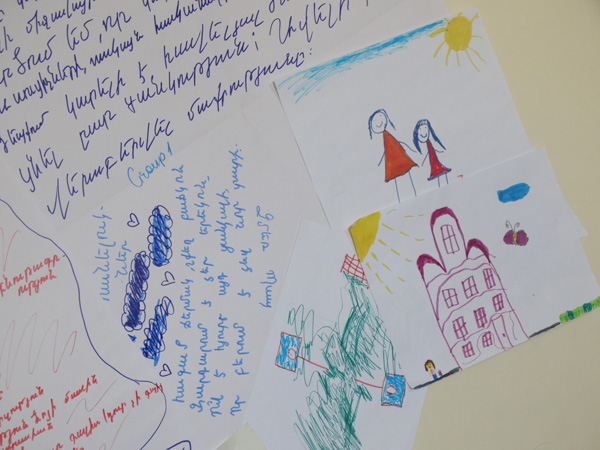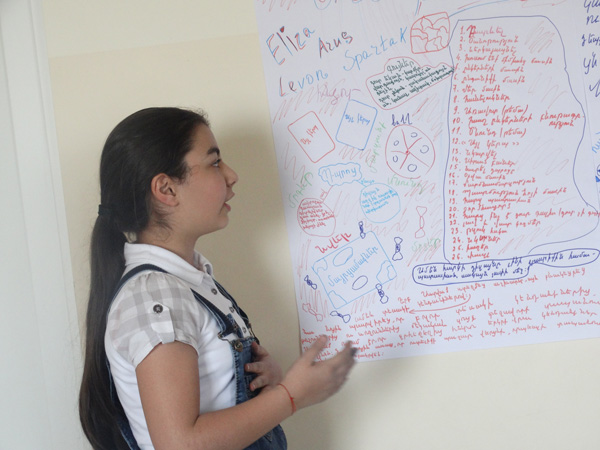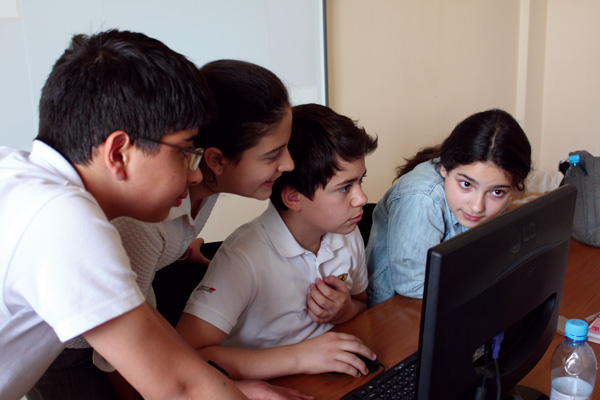The young researchers used lots of different games and activities to encourage the younger children to talk about their experiences and feelings.
At school we don’t like …
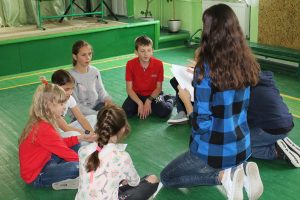 Teachers take our phones from us, put them in a box, and do not give them to us at breaks.
Teachers take our phones from us, put them in a box, and do not give them to us at breaks.- Sometimes the teacher shouts.
- Sometimes the boys behave badly, they fight among themselves.
- The teachers do not explain why they give us bad marks.
The young researchers discussed “why is it difficult to express ourselves?”
| We don’t have the skills. | We are shy and afraid of looking stupid. |
| We are afraid we cannot formulate our ideas. | We do not think adults will take us seriously. |
| We think our opinion is not valued and will not change anything. | It’s hard to find a common language with an adult. |
| Our parents do not take us seriously, even the older young people (20 years old), so it is important to find ways to communicate with all people. | Parents are not interested in our opinion. Or they pretend that they listen to us; nevertheless, they do not listen to what we said. |
Five out of nine younger children said that teachers and adults did not listen to them. Sometimes they wanted to say something but were too scared.
- Should not be angry.
- Should not ask us to do homework.
- Should play with us more often.
- Should play more football in the playground.
- Should not write [bad] comments.
What was it like working as researchers with younger children?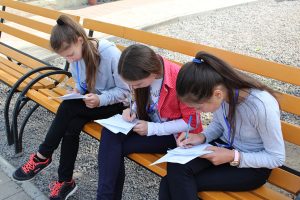
- We became more united.
- It is interesting to work in a team.
- We needed to listen to each other.
- You need to help your fellow researchers.
- We must not quarrel.
- We learned a lot.
What was it like working with kindergarten children?
- They are so small!
- How do educators cope with them?
- It is necessary to give a medal to educators after one working day!
- Compared with the primary school, it is more difficult but also interesting.
- The children speak openly and sincerely; they do not think what to say, they speak it as it is. And it was cool!
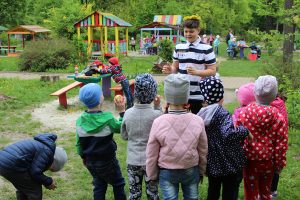
- Today was an interesting and difficult day; we played a lot. Keeping children interested is hard. Nevertheless, they are so sweet, sincere, they do not know how to lie, they tell us about their relatives.
- They can cry so quickly, and we do not have time to understand why.
- Teachers do a great job working with little children.
- We think being a teacher is not as easy as it may seem; it is a difficult job.
The young researchers suggested some follow-up activities, to build on this action research:
- Conduct joint lessons. Mix students of different classes (ages) to establish mutual understanding between us and them.
- Conduct other research in the warmer weather in the playground (for example, about natural history).
- Motivate children to tell not horror stories but fairy tales, as well as write them down in their notebooks.
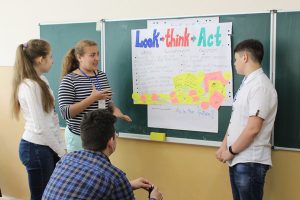
- Use ‘Beyblade’ for educational purposes, for example: contests, competitions. [Beyblades are spinning toys that the younger children were very interested in and wanted to play with a lot.]
- Show children cartoons about friendship. It is difficult to explain what friendship is and how to be friends. Involve parents so that the approach is the same for teachers at school as well as for parents.
- Allow the use of mobile phones for educational purposes, to explain the culture of communication with the gadget.
- Undertake action research with other primary schools nearby. This would help with the transition from primary school to our secondary school.
- Use project activities in school children’s education. We are ready to share our knowledge and practical experience.
In Armenia the older children worked with kindergarten and primary school children.
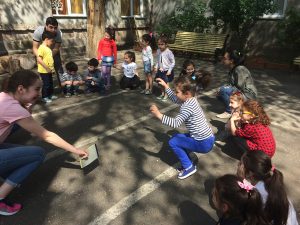 “When we visited the kindergarten, some of the younger children were excited, and some were shy. In order to create a warm atmosphere, we asked what they wanted to do. The children answered unanimously that they wanted to play in the school yard. We took into account the children’s opinions. We asked them to draw their dreams of the kindergarten and then we started asking questions.”
“When we visited the kindergarten, some of the younger children were excited, and some were shy. In order to create a warm atmosphere, we asked what they wanted to do. The children answered unanimously that they wanted to play in the school yard. We took into account the children’s opinions. We asked them to draw their dreams of the kindergarten and then we started asking questions.”
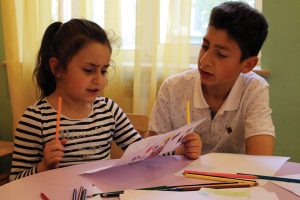 The older children had played games with the younger children, took photos, distributed sweets, asked questions, and took notes. Later, the older children made posters showing what they had found out during their research activities with younger children. Their research was focused on asking the younger children what they liked and disliked about school.
The older children had played games with the younger children, took photos, distributed sweets, asked questions, and took notes. Later, the older children made posters showing what they had found out during their research activities with younger children. Their research was focused on asking the younger children what they liked and disliked about school.
Primary school children liked:
- Teachers’ teaching method
- Getting good marks
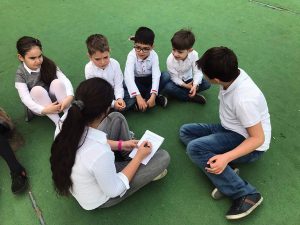
- Sleep longer
- Drawing
- Reading, playing
- Playground games
- Technology, maths and language
- Sleep, playing games
- Learning at school
- Technology
- Physical education
- Events in the school
| Primary school children “We don’t like…” | Young researchers’ ideas for solutions |
| Too many children in the classroom | Reduce the number of children in each classroom |
| Breaks are too short | Make breaks longer |
| Homework is too much and there is no time for rest | Give children less homework |
| We don’t have enough chance to use modern smart devices during the classes | Give the children chance to use electronic books and devices |
| When I hurt my leg in PE | Teachers should be more attentive |
| When I am not engaged in the activities | We suggest also organising psychological games |
| When I am mocked by teachers | Teacher should try to explain better, because when she is angry, children get upset |
| When the teacher is angry | Reduce the number of children in the class so the teacher can spend more time with each of them. Don’t get angry when children who do not want or do not understand something. Talk and listen. |
| Primary school children “We don’t like …” | Young researchers’ ideas for solutions |
| When a teacher hits a book on the table | Discuss children’s rights to make own and free decisions |
| Waking up early | More activities, moving around |
| Sitting too long | Make breaks longer |
| Play with Lego | Take into account children’s opinions and listen to their wishes |
| Classes are long | Different approaches for each child. Ask them what they would like insteads |
| Don’t like the idea of going to school | Start preparing children for school from the last year of the kindergarten |
| When I am not engaged in the activities | We suggest also organising psychological games |
| We would like to change the food (school meals) | Make them more affordable and organic food / different food |
| The lunch is expensive and not nice | Make them more affordable and organic food / different food |
Kindergarten children liked: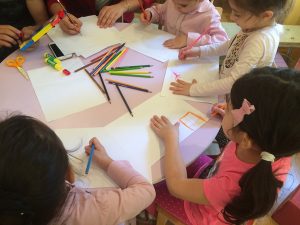
- Learning letters, numbers
- Having friends
- Running
- Drawing
- Playing the piano
- Food in the kindergarten
- Singing and dancing
- Teachers and the nuns
- I like my group room
- Playing games
- Playing with plasticine
| Kindergarten children “We don’t like…” | Young researchers’ ideas for solutions |
| Spending long time in kindergarten | More games and entertainments |
| When they force you to eat | Explain to children about the usefulness of food |
| Some children don’t like sleeping | Let children make choice, sleep or not |
| Eating soup (borsch) | Explain children about the usefulness of food |
Editor’s thoughts
I definitely share many of the sentiments expressed by the young researchers from Ukraine. I think young people like myself find it difficult to express their ideas, and a major source of this difficulty is the way our ideas are treated by adults, be they our parents, teachers or older young people. I agree with what the action researchers said – adults do not seem to value our opinions or take them seriously, even if most wouldn’t say so explicitly.
My personal experience with this is with my political beliefs. I have rather radical, unusual political views, being a communist, so often when I express these views to any adults there is a presumption that I haven’t properly developed my ideas, that I am too young to see the realities of society or that I am just following some social media trend. It seems that, overall, whenever adults are confronted by young people with ideas they don’t agree with, they dismiss them because we are relatively inexperienced in life. I would say that, though I may only be sixteen, I am perfectly able to develop reasoned, justified opinions, and thus my ideas should be treated as equal to any adult’s. It is this dismissal of our ideas which denies children a voice. If you treat someone’s ideas and opinions as inferior, they will internalise that, develop a negative self image and their self confidence will be severely eroded which prevents them from expressing their opinions in future.
Ben Perry, age 16, UK
